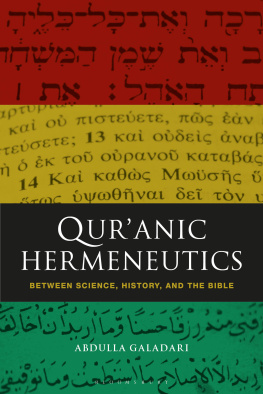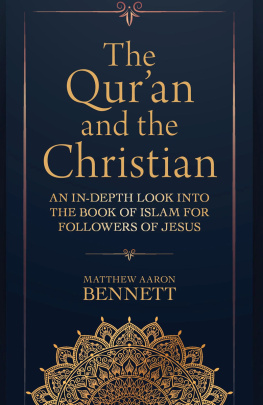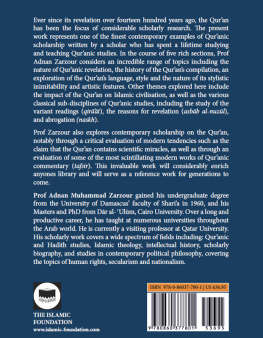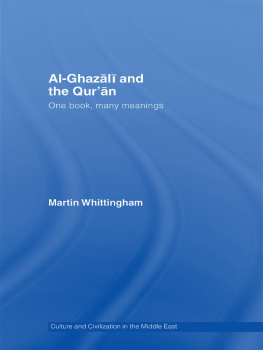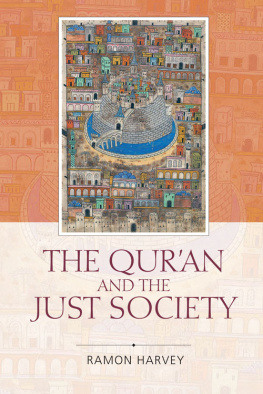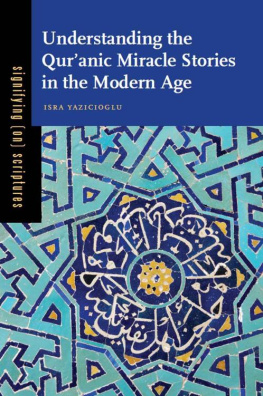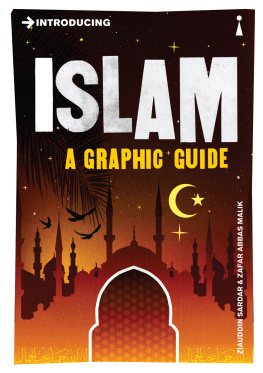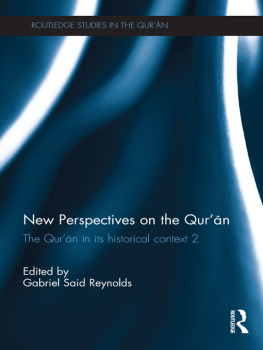
Quranic Hermeneutics
Also available from Bloomsbury
The Composition of the Quran, Michel Cuypers
Psychological Hermeneutics for Biblical Themes and Texts, edited by J. Harold Ellens
The Quran and Modern Arabic Literary Criticism, Mohammad Salama

To the Truth
and all beings who are thirsty for knowledge and truth
Contents
This book is a product of years (and perhaps lifetimes) of work in search for truth and seeking the reality of God. I fully appreciate that some Muslims might find certain arguments made controversial, especially on the psychological state of Muammad. However, statements made are not meant to offend anyone, but a sincere search for knowledge and truth. Not a single disrespect is intended in any way.
I would like the reader to have an open mind. You do not need to agree to all, part, or any of the arguments. My intention is to provide observations without necessarily making assertions. I do not want to push any conclusion on you. I would love for you to draw your own conclusions based on these observations. The Quran, after all, frequently invites its audience to think, contemplate, ponder, and reflect upon its words. As such, if I achieve in making you do just that, then I would accomplish that goal, even if you end up disagreeing with me. We are all in a journey in pursuit of truth without any hidden agendas or blind convictions. I am fallible and when we put our minds together we can further understand and learn from each other what lies behind reality.
I hope you forgive my shortcomings and insanity.
I would like to extend my gratitude to everyone who helped me throughout my life. First, I would like to thank whatever Universal Force or Power that brought me into existence, and if I do not exist in reality, then whatever that made me think that I do.
I also like to thank all my family, who both genetically and environmentally reared me. I especially am appreciative to my late grandmother Zainab, who took me in her arms as a baby, showered me with her love, and raised me, as well my late grandfather Abdulla, who took me all around and taught me how to be human; my parents, Ibrahim and Afaf, and siblings, Hassan, Sarah, and Hind, who nurtured me and I grew up fondly with; my wife, Fatma, who supported me and endured my insanity.
I extend my appreciation to the many mentors, friends, and colleagues who shared with me their wealth of knowledge, such as Alhagi Manta Drammeh, Gabriel Reynolds, J. Harold Ellens, Ulrika Mrtensson, Gordon Newby, Linda Joelsson, Zohar Hadromi-Allouche, John Kaltner, David Penchansky, Reuven Firestone, Martine OKane, Luqman Zakariyah, Masoumeh Velayati, Hossein Godazgar, Michael Pregill, Holger Zellentin, Munim Sirry, and the late Andrew Rippin; as well as the many more whose presence alone provided me with insightful vibes.
I also wish to thank the anonymous reviewers who provided me with their invaluable feedback and supported the madness of this book. I would also like to thank my close friends Ahmad al-Khuraibet and Mansour al-Khouri who stand with me and support me even when my wild mind delves into the darkness of caves in search of a spark. I also want to acknowledge my gratitude to Ben and Diane Blackwell for wonderful discussions and their inspirational friendship.
In addition, I wish to thank the air breeze for allowing me to breathe the freshness; the sun for lighting our day; the rain for bringing forth living waters; the darkness for allowing us to see; the bees without whom we will have scarce fruits; the enemies, who are in dire need of our love; the all for everything its entirety provides; and the supreme existence in which nothing in reality exists except it.
Arabic
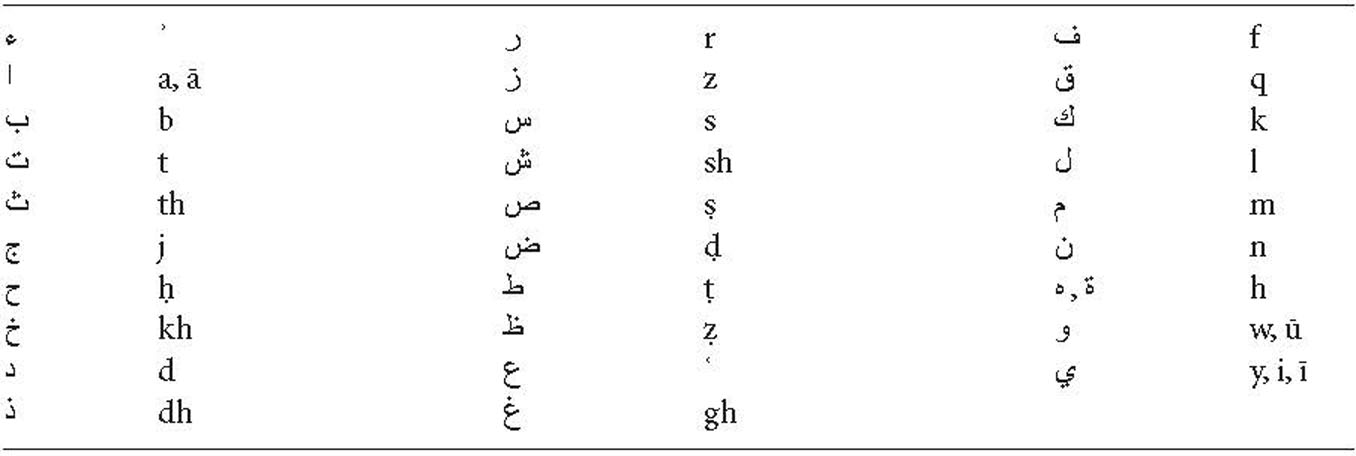
The short vowelization at the end of a word is typically omitted.
I am using The Study Quran (henceforth TSQ) as the main translation for the Quranic quotations throughout the book, unless otherwise noted: Nasr, Seyyed Hossein, ed., The Study Quran (New York, NY: HarperOne, 2015).
Other languages
The book uses other languages, mainly Semitic and Greek. For Semitic terms, the transliteration follows similar to the Arabic with vowelization sometimes omitted. For Greek, it follows conventional methods.
This book investigates a hermeneutical method for the Quran called intertextual polysemy. Since the method makes extensive use of intertextuality and polysemy, linking various words in the Quran with one another, as well as linking the Quran with the Bible, then it is important to understand why that is. Because the intertextuality and the use of polysemy and metaphor is complex, very much like jigsaw puzzle pieces in need of putting together, it brings us to an understanding of the high sophistication of Quranic linguistics. This book proposes three possibilities of how that came about: (i) Muammad was in an altered state of consciousness and the flow came naturally to him, according to our modern understanding of neuropsychology, (ii) the author(s) and redactors of the Quran applied a highly sophisticated interweaving of intertextualities, or (iii) there is a divine element that built this sophistication within the Quran, while perhaps Muammad was unaware of it, causing even him to be unable to comprehend what he is hearing of the Quranic words. Each one of these possible reasons gives us a different perspective, historical, literary, and theological respectively.
Personally, I lean more toward the first reason, which has a neuropsychological basis. This is because it offers us a possible reason with the least assumptions. The level of sophistication in the intertextual examples that are in this book seems unlikely to be the product of a highly erudite team of author(s) and redactors. It seems much more likely that this level of sophistication was produced by a single person than many working together. Since the third reason is theological, it requires the assumption of divinity, the ability of this divinity to communicate with humans, and a reason for such divinity to do so. As such, it becomes more of a philosophical exercise that can only be speculated upon. Therefore, I find that by applying Ockhams razor, the first reason is the simplest to answer why the Quran can perhaps have this high level of sophistication in its intertextualities.
To be clear, leaning toward the first reason, which uses our scientific knowledge of neuropsychology, does not necessarily mean I am a reductionist. If there is a divine or mystical element in the revelation and inspiration of the Quran, it is very much possible that it has occurred through a natural method of neuropsychology. As such, I am not dismissing divine origination of the Quran by accepting a scientific reason of what perhaps naturally occurred to Muammad. Today, we have scientific knowledge of what natural phenomena cause rainfall, which include the combination of atmospheric moisture, temperature, pressure, etc. The Quran frequently states that it is God that causes rain to fall (e.g., Quran 27:60, 29:63, 39:21). If we accept the scientific causes of rainfall, it does not necessarily mean that we dismiss Gods role in it. It is very much possible that God causes the rain to fall through the means of natural laws, which, if there were a God, natural laws could have been enacted by God. Therefore, if we accept a scientific cause of what occurred in Muammads mind during the time of his alleged revelation, it also does not necessarily mean that we are dismissing its divine origination, if any.
Next page
